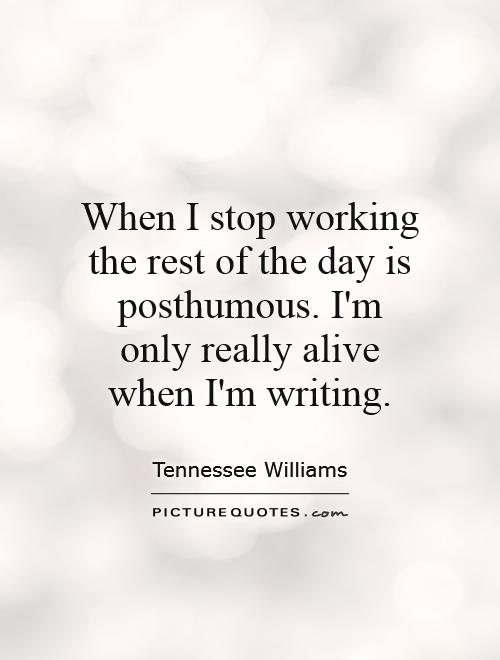When I stop working the rest of the day is posthumous. I'm only really alive when I'm writing

When I stop working the rest of the day is posthumous. I'm only really alive when I'm writing
Tennessee Williams, the renowned American playwright, is often quoted as saying, “When I stop working the rest of the day is posthumous. I'm only really alive when I'm writing.” This statement encapsulates the essence of Williams' dedication to his craft and the profound impact that writing had on his life.Williams was a prolific writer, known for his emotionally charged plays that delved into the complexities of human relationships and the struggles of the human condition. His works, such as "A Streetcar Named Desire" and "The Glass Menagerie," are considered classics of American theater and have left a lasting legacy in the world of literature.
For Williams, writing was not just a job or a hobby – it was a way of life. He poured his heart and soul into his work, using his own experiences and emotions to create characters and stories that resonated with audiences around the world. Writing was not just a means of expression for Williams, but a form of catharsis that allowed him to explore his own inner demons and come to terms with the complexities of his own existence.
When Williams was in the throes of writing, he was truly alive. The act of putting pen to paper or fingers to keyboard allowed him to tap into a creative energy that fueled his passion and drive. The world around him faded away as he became immersed in the world of his characters, living and breathing their joys and sorrows as if they were his own.
But when the writing stopped, Williams felt a sense of emptiness and loss. The rest of the day seemed dull and lifeless in comparison to the vibrant world he had created on the page. Without the creative outlet of writing, Williams felt disconnected from himself and the world around him, as if he were merely going through the motions of existence without truly living.












 Friendship Quotes
Friendship Quotes Love Quotes
Love Quotes Life Quotes
Life Quotes Funny Quotes
Funny Quotes Motivational Quotes
Motivational Quotes Inspirational Quotes
Inspirational Quotes